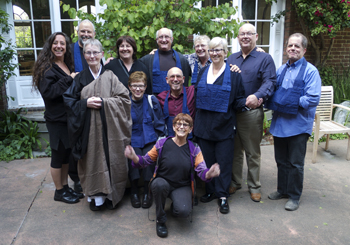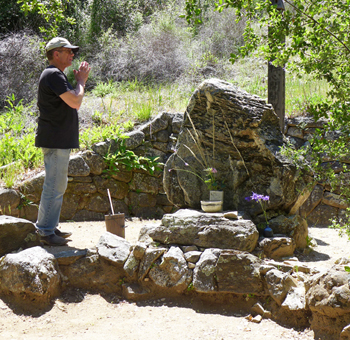A spotlight on SFZC volunteers, by Dennis McNally
One part class and one part volunteer work group, Saturday Sangha at City Center represents a unique opportunity to find yourself in an intimate community within the larger Zen Center sangha—and new members are warmly welcomed to join. We are among those who ring the bells, serve the tea, and stir the soup, all ways to support the temple on its busiest public day of the week. Once the work is done, we enjoy lunch together and a brief class with the head of practice, Anshin Rosalie Curtis.
In addition to the weekly meetings on Saturdays, an annual bonus of being a member of Saturday Sangha is the opportunity of a week of work practice at Tassajara in the spring. As part of the group, I recently enjoyed five such wonderful days at Tassajara in April. Not everyone would consider getting up at 5:30 am and working hard all day to be a bonus, but those folks probably haven’t yet been to Tassajara. Believe me, it’s a very generous gift, and I explain why further below.
More about Saturdays
On Saturday mornings, we meet for a work circle at 8:50 a.m. There we divvy up the ways we can help, either by working in the kitchen to prepare tea, cookies and lunch, or by being part of the doanryo, which covers certain ceremonial chores for the 9:25 a.m. zazen period and 10 a.m. dharma talk. For me, participating in the doanryo really deepens the emotional and spiritual impact of the program, and is gratifying indeed. Mostly, though, I work in the kitchen on Saturday mornings, and that too generates feelings of deep connection with everyone.
Founded around 15 years ago, Saturday Sangha consists of nonresident volunteers and welcomes everyone with a practice. Among us there is a surgical nurse, a custodian, a photographer, a teacher of acupuncture, a librarian, an elementary school teacher, a stagecraft professional, a department head at UCSF, a social worker, and lots more. Some of the participants have been coming for most of those 15 years, and some are brand new. I think all would agree that we are a welcoming group and easy to join.
My story is that I came to Zen Center after one of those life shake-ups that we all experience, and began to attend evening zazen regularly. As time went on, I wanted to explore things more deeply, and eventually a friend sent me to Saturday Sangha.
Some of the basic ceremonial jobs that Saturday Sangha members have the opportunity to learn:
- The doorwatch sits just inside the Laguna Street side-door entrance to the zendo acting as a greeter and watchful presence.
- The greeter/chiden is the welcoming presence in the lobby at the main entrance on Page Street; he/she also lights the candles in the Buddha Hall for the dharma talk.
- The doan rings the bells in the zendo for zazen and in the Buddha Hall for the dharma talk.
- The fukudo hits the han, a wooden gong calling people to the zendo for zazen.
- The shoten hits the densho, the bell calling people to the Buddha Hall for lecture.
- The jiko is the attendant who accompanies the priest at the beginning of zazen, and the speaker in the Buddha Hall.
Our half-hour class with Rosalie after lunch discusses whatever we are currently reading. Right now it’s Pema Chodron’s No Time to Lose, a study of Shantideva’s The Way of the Bodhisattva. Before that it was Shohaku Okamura’s Realizing Genjokoan. It’s all highly educational, and I think most Zen students would agree with me when I say I’m not sure whether I get more out of the class or the kitchen practice.
In a completely casual way, Saturday Sangha deepens not only our practice (a number of the members have progressed to becoming temple residents) but also our social relationships: just this past Saturday we had a wedding for two people who met in the art lounge thanks to Saturday Sangha. Sometimes we go out for coffee after class, and it’s easy and honest to say that such get-togethers come with a lot of fun.
More about Retreat
As I said to start with, another reward of Saturday Sangha service is a chance to join in the work period at Tassajara, Zen Center’s monastery in the Ventana Wilderness. In the summer, Tassajara welcomes guests for workshops and haute-cuisine vegetarian dining, as well as the luxury of the hot springs baths. For the rest of the year, it’s the scene of very demanding Zen training, so in April and September, volunteers come down to help get the place ready for guest season or put things away for the winter.
During this work period, we work in the kitchen or clean rooms—or many of us who, unlike me, actually have practical skills can work on new building projects or making repairs. In the process, we get to hang out with a really amazing span of people. Students come from all over the world to serve in apprenticeships; this year I spent time with a young lady from Spain and a man from Moscow. Then there are the volunteers who just love Tassajara, like the man who comes every year to tend the bamboo, and another man I met who doesn’t even have a formal Zen practice—he just likes Japanese architecture and has been coming to help out for the past 20 years.
On my first visit to Tassajara, I found myself grumbling at the end of the one-hour ride in over a 14-mile dirt road. In the course of the hour, you climb about 3000 feet to a crest of around 5000 feet (there’s often snow there in April) and then drop 3000 feet down to the monastery, which is a collection of buildings along Tassajara Creek in a narrow valley.
Later it dawned on me that the challenging road in was half the point: when you have to work hard to cross the threshold, you realize how precious and extraordinary is this wonderful isolation. No cell phones! No email! Wonderful silence! For those of us used to listening to the sirens and the truck brakes and the motorcycles at the corner of Page and Laguna, sitting in the Tassajara zendo is one of the great privileges imaginable.
And to top it all off, after getting up at 5:30 a.m. and working hard, and then getting a nice soak in the hot springs baths and a great dinner, you get to sit a little more zazen and end the day by chanting the Refuges, a very beautiful sequence of verses in Pali, the language of the Buddha himself. As far as I know, this is the closest we ever come to singing together, and in the sweet dark quiet of the wilderness, it’s glorious.
And that is truly a bonus worth working for.
__________
If you are interested in joining Saturday Sangha, please call the front office for information (415-863-3136), email the City Center tanto at cctanto@sfzc.org, or come to the Saturday program when there is a public lunch (most Saturdays) and join the group discussion at noon.














